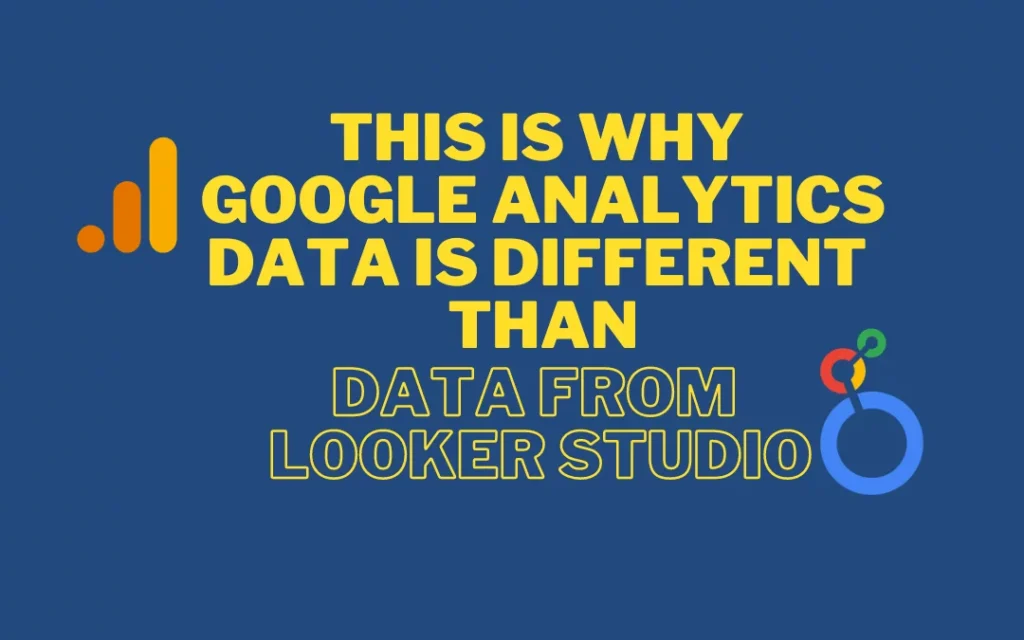Why Google Analytics Data is Different from Data from Looker Studio?

Tracking website performance is crucial for any online business, and there are several tools available for this purpose. Two popular tools for this are Google Analytics and Looker Studio (formerly known as Data Studio). First one is a tool that provides insights into website traffic and user behavior and the second is BI Tool Which is Used for visual representation of data. but there may be disparities between the data presented in them. In this post, we will discuss the disparity between Google Analytics and Looker Studio Data and what causes it.
1. Differences in Data Collection
One of the main reasons for the disparity in data between Google Analytics and Looker Studio is the difference in data collection methods. Google Analytics uses JavaScript code to track website visitors, which is implemented on each page of the website. On the other hand, Looker Studio pulls data from Google Analytics and other sources through APIs. This difference in data collection can lead to differences in the data presented by the two tools.
2. Processing and Reporting Differences
Another reason for the disparity in data between the two tools is the processing and reporting differences. Google Analytics processes data in real-time and provides reports based on that data. Looker Studio, on the other hand, processes data in batches and provides reports based on that processed data. This batch processing can lead to differences in the presented data, especially if there are changes in website traffic during the processing time.
3. Discrepancies in Metrics and Dimensions
In addition to the above differences, there may be discrepancies in the metrics and dimensions presented in Google Analytics and Looker Studio. Google Analytics provides a wide range of metrics and dimensions, but not all of them are available in Looker Studio. Furthermore, Looker Studio may use different names for metrics and dimensions than Google Analytics, leading to confusion and disparity in the data presented.
Conclusion
In conclusion, while Google Analytics and Looker Studio both provide valuable insights into website performance, there may be disparities in the data presented by the two tools. These disparities may arise due to differences in data collection methods, processing and reporting, and discrepancies in the metrics and dimensions presented. It is important to understand these disparities while using these tools for website performance tracking, to ensure accurate data analysis and decision-making.
Data Integration and Accuracy Challenges
Modern analytics platforms encounter complex data integration challenges that can significantly impact reporting accuracy and business decision-making. Understanding data source limitations, processing delays, attribution models, and data sampling methods is crucial for generating reliable insights. Organizations must implement robust data governance practices, establish clear data quality standards, and develop comprehensive validation processes to ensure analytical accuracy.
Advanced Reporting and Analysis Techniques
Leveraging advanced analytics capabilities requires deep understanding of custom dimensions, calculated metrics, data blending techniques, and statistical modeling approaches. Professional analysts employ sophisticated methods including cohort analysis, predictive analytics, and multi-touch attribution modeling to extract deeper insights from standard reporting platforms. These advanced approaches enable more sophisticated business intelligence and strategic decision-making processes.
Enterprise Analytics Solutions
NextGrowthLabs provides enterprise-level analytics consulting that addresses complex data integration, privacy compliance, and scalability requirements. Our team helps organizations balance analytical depth with operational efficiency while ensuring adherence to industry standards and regulatory requirements. We specialize in implementing comprehensive analytics frameworks that deliver actionable insights and drive sustainable business growth across multiple channels and market segments.


